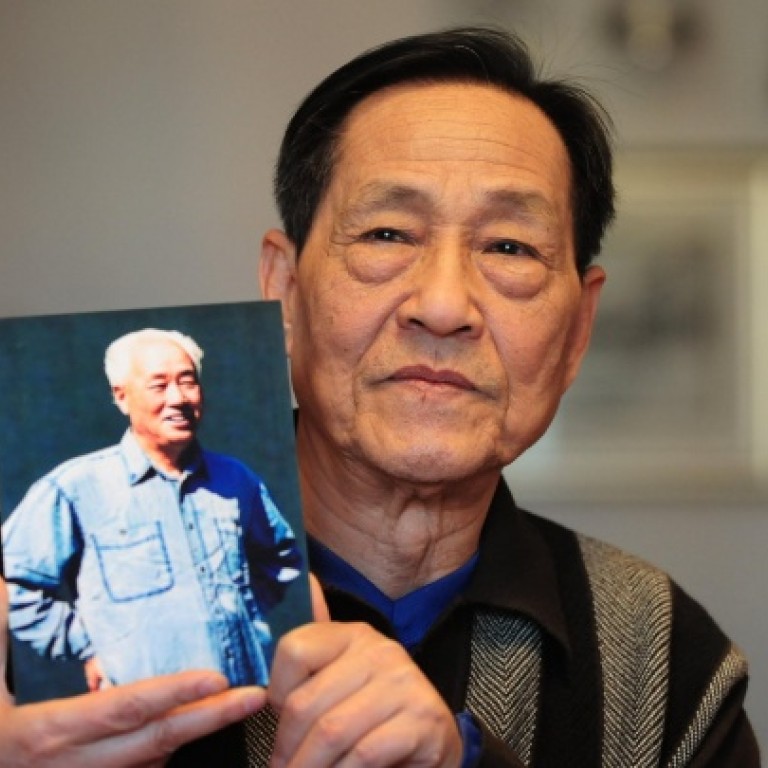
China should 'repudiate June 4', says party official jailed over Tiananmen
Bao Tong, the most senior party official jailed over Tiananmen movement, says all must reflect on 1989 crackdown if the nation is to progress
Bao Tong , the most senior party official jailed over the Tiananmen pro-democracy movement, said the crackdown must be "completely repudiated" if China is to move forward.
The former top aide of reformist leader Zhao Ziyang said all Chinese people - including top leaders - should stop protecting the legacy of Deng Xiaoping and Mao Zedong and reflect on the events of June 4, 1989.
"Like the Cultural Revolution must be totally repudiated, June 4 must be completely repudiated," Bao said in a telephone interview.
"Like Mao was the symbol for the Cultural Revolution, Deng was the symbol of the June 4 [crackdown]."
Bao was director of the party's Political Reform Office and a member of the Central Committee when the government used armed troops and tanks to crush the student-led movement on June 4, killing hundreds, maybe thousands, of civilians.
"I think every Chinese - officials or ordinary people, those who were persecuted or benefited [from the crackdown] - should all reflect upon this issue," he said. Bao, 81, was jailed for seven years, detained for a further year and has been under house arrest since his release in 1997.
He said he was impressed by President Xi Jinping's emphasis on the importance of constitutional rule, but was "perplexed" it was followed by what appeared to be a tightening of ideological control in recent weeks. A editorial proclaimed the Communist doctrine as "the truth of the universe". A commentary cited Xi as saying the country would have plunged into chaos if Mao had been totally discredited after the Cultural Revolution.
It was also reported university staff have been ordered to steer clear of seven taboo topics in lessons, including press freedom and civil rights.
"[Some say] our China model is the best in the universe and our truth is the truth of the universe," Bao said. But "without repudiating Mao Zedong and Deng Xiaoping, it's impossible for China to progress".
Bao - who admires Xi's father, reformist party elder Xi Zhongxun - supported Xi's view on the importance of implementing the constitution, but said he would be disappointed "if it only stays a dream", an apparent reference to Xi's "Chinese Dream" slogan for building a strong and prosperous nation.
"I hope Xi Zhongxun's son will do well, otherwise I shall be very disappointed," he said.
Bao's house arrest makes it difficult for friends to visit as they are routinely harassed. Journalists are required to register with security agents. He said he had no regrets about his fate, but he grieved for his countrymen, who had been deprived of free speech for more than two decades.
The silencing of dissident voices had disastrous consequences, he said. "If you cover the mouths of a hundred people, there could still be hundreds, thousands, tens of thousands of mouths still speaking.
"But if they silence 1.3 billion people, that's frightening."
After the army opened fire in 1989, lively debates on university campuses and the streets of Beijing died down; the state press, which had grown bolder during the 1980s, was silenced; legislation planned to protect press freedom was quashed; and political reforms were abandoned.
"If all these mouths were still talking, I think [our society] wouldn't be as depraved as it is now," he said. "Corruption, exploitation, the lack of respect for law, these had the support of tanks and machine guns."
Bao, once the political secretary to the Politburo Standing Committee, blamed the barring of free speech after June 4 for the rampant corruption, inequality, environmental degradation and moral crises of today.
And paramount leader Deng, he said, should have foreseen the consequences.
Bao was accused by a court in 1992 of "leaking a state secret" and "inciting counter-revolutionary propaganda" during the pro-democracy movement. He denied the charges.
Initial official reports in 1989 accused Bao of telling his staff of the declaration of martial law before it was officially announced.
Then an indictment in 1992 instead accused him of telling his staff that Zhao would step down.
He insisted these accusations were groundless, but the court still convicted him of revealing an unspecified "important state secret".

